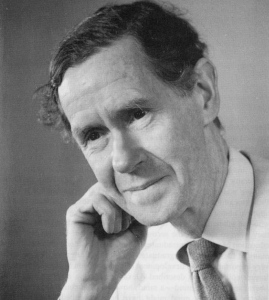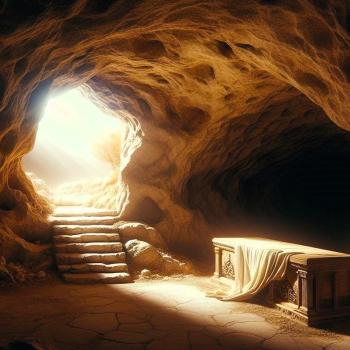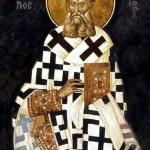The Australian philosopher John Leslie Mackie’s 1955 article, “Evil and Omnipotence,” is widely considered one of the most forceful articulations of what is now known as the Logical Problem of Evil (LPE).
It’s often said that the LPE is no longer considered a valid argument. It supposedly has succumbed to purely logical objections raised by the Christian philosopher Alvin Plantinga in the 1970s – which we will look at in a moment.

In its purest force, the LPE is as follows:
P1. If an omnipotent, perfectly good God exists, evil would not exist.
P2. Evil exists.
C1. Therefore, an omnipotent, perfectly good God does not exist.

As Mackie articulates the argument in his essay, the proposition that God is omnipotent, omniscient and perfectly good is logically inconsistent with the proposition that evil exists. “There seems to be some contradiction between these… propositions, so that if any two of them were true the third would be false.”
Yet Mackie’s First Premise Is Not Self-Evident
The problem is, this assertion is not self-evident.
There is nothing inherent in the claims that an all-powerful and good God exists and evil exists that is contradictory on its face.
This conclusion must be deduced from the propositions somehow.
To do that, Mackie requires some additional premises that are also not self-evident.
For example, it requires premises such as “there are no limits to what an omnipotent thing can do.” Or: “a good being always eliminates evil as far as it can.”
With these additional premises, Mackie’s argument can be boiled down to simply this. “It is not possible for an omnipotent good God and evil to co-exist.”
Mackie’s essay anticipated many of the future objections to this argument.
Some of these objections, as Mackie foresaw, involve qualifying what is meant by the adjective “omnipotent.”
Others center around the definition of “evil.”
Could God Have a Good Reason for Permitting Evil?
Theist philosophers such as Alvin Plantinga argue that God may have a morally sufficient reason for permitting evil.
This includes both moral evil (free agents doing evil deeds) and natural evil (pain, suffering and death caused by natural phenomena God created).
Plantinga argues that God cannot create genuinely free creatures who never choose to do evil because then they would not really be free.
Anticipating Plantinga’s objection, Mackie argues that the Free Will Defense (FWD) to the LPE is really not a defense at all.
Instead, it simply leads to what he calls the Paradox of Omnipotence.
If an omnipotent being can create creatures who may freely choose evil, then it is creating creatures it cannot control.
This means such a being is not really omnipotent.
Mackie claims that this is a paradox.
It is a paradox because whether an omnipotent being can or cannot create creatures it cannot control.
Either way this proves omnipotence is impossible.
A truly omnipotent being could create free creatures who always choose to do what is right, Mackie argues.
The response of theists is that it does not limit God’s omnipotence to concede that God cannot do logically impossible things, such as creating a square circle.
Theists have always insisted that any realistic understanding of omnipotence precludes logical impossibilities, such as God creating a rock so heavy He couldn’t lift it.
Other philosophers try to get around this objection by simply conceding that God is not omnipotent in any real sense.
God may be the most powerful being, these philosophers say, but there are many things that God cannot do, such as eliminating all evil in the universe.
In any event, the Logical Problem of Evil has fallen out of favor among professional philosophers precisely because it simply doesn’t deliver what it promises: a purely logical proof that God cannot exist if evil exists.
Yet the Problem of Evil Remains, Logical or Not
However, that doesn’t mean that the Problem of Evil itself has been eliminated. Far from it.
These days, philosophers argue for what is sometimes called the evidential or empirical problem of evil.
They simply claim that it is unlikely, given the amount or type of evil that exists in the universe that a good God exists.
A similar objection can be made to this argument, however, as is made to the Logical Problem of Evil.
How do you know, the theist philosopher asks, that God does not have good reasons for permitting even horrible moral evil? Given our paltry intellects, and the vastness of the cosmos, how can we possibly judge that no morally sufficient reason exists?
This is an old objection, in fact dating all the way back to the Book of Job in the Old Testament.
“Where were you when I laid the foundation of the earth?” God asks Job. “Tell me, if you have understanding. Who determined its measurements—surely you know! Or who stretched the line upon it? On what were its bases sunk, or who laid its cornerstone, when the morning stars sang together and all the sons of God shouted for joy? (38:5-7, ESV).”
Of course, this doesn’t persuade everyone.
Albert Camus’s Objection
In Albert Camus’s famous novel The Plague, there is a poignant scene between the atheist physician Dr. Rieux and the Jesuit priest Fr. Paneloux as they are caring together for the victims of the plague that strikes Oran.
The two men care for hundreds of people as they are dying, but then they both face the death of one particular little boy, who suffers tremendously as he succumbs to the plague.
Fr. Paneloux prays to God to spare the child but the boy dies anyway. Dr. Rieux stands up, full of silent rage, and Fr. Paneloux tries to comfort him. “Perhaps we must love what we do not understand?” the Jesuit asks gently.
Dr. Rieux stiffens. “No Father, I have a very different idea of love,” the doctor replies. “And I will refuse to my dying day to love a scheme of things that puts little children to torture.”
Indeed.
The Problem of Evil remains for everyone, both believers and unbelievers alike, even if the logical version is no longer as persuasive as it once was.

Robert J. Hutchinson is an award-winning Catholic writer.
He is the author of numerous books of popular history, including Searching for Jesus: New Discoveries in the Quest for Jesus of Nazareth (Thomas Nelson), The Dawn of Christianity (Thomas Nelson), The Politically Incorrect Guide to the Bible (Regnery) and When in Rome: A Journal of Life in Vatican City (Doubleday). Born and raised in the Pacific Northwest, he attended Catholic schools, studied philosophy at a Jesuit university, moved to Israel to learn Hebrew, and then earned a degree in New Testament studies.
Hutchinson is currently pursuing graduate studies in the Philosophy of Religion in Europe and writes for many publications. You can read more about the author at www.RobertHutchinson.com.
















